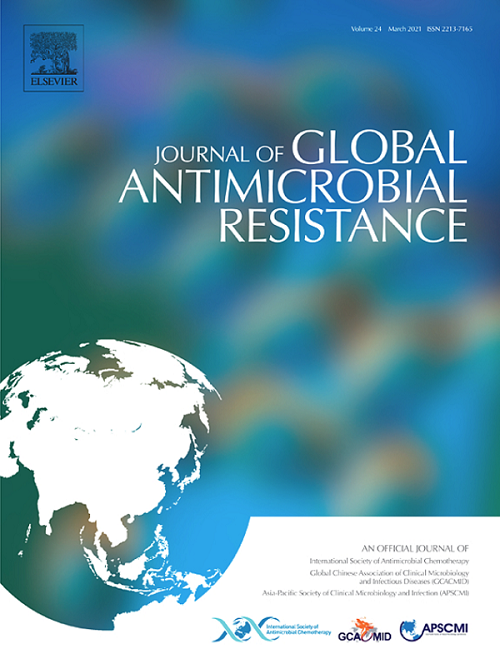墨西哥50家医院实施抗微生物药物管理规划的进展和挑战。
IF 3.7
3区 医学
Q2 INFECTIOUS DISEASES
引用次数: 0
摘要
目的:抗菌素管理计划(ASP)旨在提高医疗处方质量和控制抗菌素耐药性(AMR)。关于在墨西哥医院实施ASP的信息很少。本研究旨在描述墨西哥医院样本中的ASP特征,并确定其实施过程中的促进因素和障碍,包括COVID-19大流行。方法:根据CDC和WHO ASP的核心要素,对ASP的组织、结构、教育、指南、干预措施、监测、监测和报告流程进行自我评估电子调查。该调查是针对2021年和2022年在墨西哥开展定期抗菌药物管理活动的公立和私立医院样本中的ASP团队负责人进行的。结果:50家医院参与调查:公立医院32家(64%),私立医院18家(36%)。52%的医院有正式的ASP文件,12%的医院为ASP专业人员分配了保护时间,34%的医院有年度计划。大多数医院有ASP委员会(68%);只有14%的人拨款。大多数干预措施是限制性的(68%)。61%的医院定期编制抗生素累积图,54%监测抗菌药物用量(DDD/DOT), 44%监测指南的遵守情况,24%监测干预措施的实施情况。确定的主要障碍是工作量过大、人力资源不足以及因COVID-19而导致的医院转院(特别是公立医院),而医院当局的支持是最重要的促进因素。结论:这一诊断为加强国家医院ASP的实施提供了基线。国家和机构政策应优先针对ASP规划、监测和人力资源分配。本文章由计算机程序翻译,如有差异,请以英文原文为准。
Progress and challenges in the implementation of antimicrobial stewardship programs in 50 hospitals in Mexico
Objectives
Antimicrobial stewardship programs (ASP) aim to improve the quality of medical prescribing and contain antimicrobial resistance (AMR). There is little information on the implementation of ASP in hospitals in Mexico. This study aimed to characterize ASP in a sample of hospitals in Mexico and to identify the facilitators and barriers perceived in their implementation, including the COVID-19 pandemic.
Methods
A self-assessment electronic survey was adapted from the CDC and WHO ASP's core elements, considering ASP organization, structure, education, guidelines, interventions, surveillance, monitoring, and reporting processes. The survey was addressed to ASP team leaders in a sample of public and private hospitals carrying out regular antimicrobial stewardship activities in Mexico in 2021 and 2022.
Results
Fifty hospitals participated: 32 (64%) public and 18 (36%) private. Fifty-two percent of hospitals had an official ASP document, 12% allocated protected time for ASP professionals, and 34% had an annual plan. Most hospitals had an ASP committee (68%); only 14% allocated funding. Most interventions were restrictive (68%); 61% of hospitals prepared cumulative antibiograms periodically, 54% monitored antimicrobial consumption (DDD/DOT), 44% monitored adherence to guidelines, and 24% monitored the implementation of interventions. The main barriers identified were work overload, insufficient human resources, and hospital reconversion due to COVID-19 (particularly in public hospitals), while the support of hospital authorities was the most important facilitator.
Conclusions
This diagnosis provides a baseline for strengthening ASP implementation in the country's hospitals. National and institutional policies should prioritize targeting ASP planning, monitoring, and human resources allocation.
求助全文
通过发布文献求助,成功后即可免费获取论文全文。
去求助
来源期刊

Journal of global antimicrobial resistance
INFECTIOUS DISEASES-PHARMACOLOGY & PHARMACY
CiteScore
8.70
自引率
2.20%
发文量
285
审稿时长
34 weeks
期刊介绍:
The Journal of Global Antimicrobial Resistance (JGAR) is a quarterly online journal run by an international Editorial Board that focuses on the global spread of antibiotic-resistant microbes.
JGAR is a dedicated journal for all professionals working in research, health care, the environment and animal infection control, aiming to track the resistance threat worldwide and provides a single voice devoted to antimicrobial resistance (AMR).
Featuring peer-reviewed and up to date research articles, reviews, short notes and hot topics JGAR covers the key topics related to antibacterial, antiviral, antifungal and antiparasitic resistance.
 求助内容:
求助内容: 应助结果提醒方式:
应助结果提醒方式:


